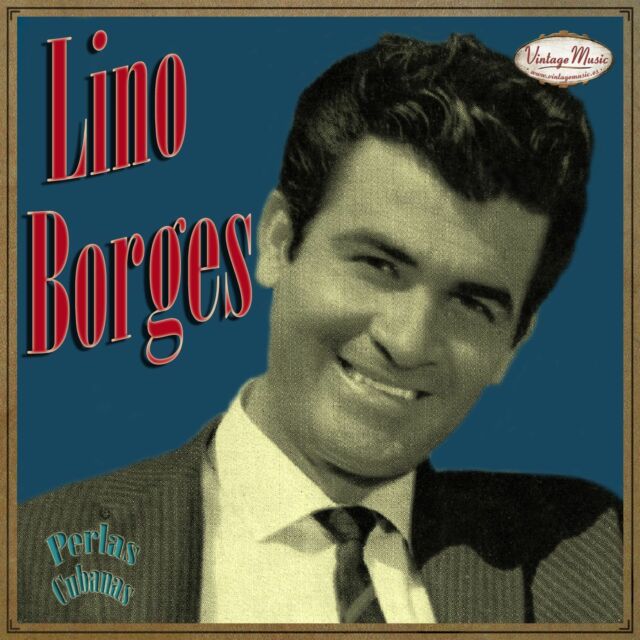
LINO BORGES “LA VOZ DEL BOLERO”, UNA DE LAS VOCES MAS CONOCIDAS Y POPULARES EN CUBA. VIDEOS. PHOTOS.
Lino Borges fue un singular intérprete de la música popular cubana. De manera muy especial resultó ser un gran bolerista. Precisamente llegó a ser catalogado como la voz del bolero por la forma en que solía cantar este género.
Severo Alberto Borges Abreu, mas conocido en el mundo artistico como Lino Borges “La Voz del Bolero” nació en Batabanò, Cuba, el 8 de agosto de 1933 y era de humilde extraccion campesina.
A los 16 años de edad lo haría ya como profesional con la orquesta de J. R. González, en la que estuvo varios años. Después cantó con los conjuntos Universal, de Melena del Sur, Casablanca, Casino, Rumbavana y Saratoga. Con este último conjunto permaneció durante 20 años, antes de convertirse en solista.
Musicólogos de la isla reconocen a Borges como uno de los más importantes cantantes masculinos del bolero en Cuba, junto a figuras como Vicentico Valdés, Abelardo Barroso, Pacho Alonso, René Cabell, Tito Gómez, Ñico Membiela, Fernando Alvarez, Orlando Contreras, Orlando Vallejo, Tejedor y Roberto Sánchez, entre tantos buenos interpretes que dio esa isla cubana.
Para los venezolanos este insigne bolerista constituyó toda una leyenda durante los años 60-70, pues fue el intérprete de una de las canciones mas bellas dedicadas a lo más íntimo del romance, compuesta por un venezolano, el Dr. Homero Parra, como lo es “Vida Consentida”.
Lo demás es historia conocida. No hubo bar ni cantina ni rockola o victrola a lo largo y ancho de la Isla que en los sesenta dejara de acoger su privilegiada voz, cuya demanda era constante por los asiduos asistentes a esos sitios, que eran como una especie de templos del saber musical en todas sus especies, pero principalmente del bolero.
Tal y como sucedía en todos los paises de habla hispana. Porque igualmente aconteció en Venezuela, Colombia, Puerto Rico, México, Perú, Chile y otros países que lo acogieron con gran admiración, abriéndoles su corazón y brindándoles la devoción que tan magnifica pieza merecía. Invitado por Homero Parra, Lino Borges asistió en 1990 al homenaje por el aniversario 25 de “Vida consentida”. Su presencia se convirtió en el suceso artístico del año en Venezuela, éxito que reeditó en 1991, cuando viajó acompañado por el cgosto de 2003 en la Habana, Cuba.
Lino Borges falleció el 23 de Agosto 2003, en la Havana, Cuba.
Lino Borges, bolerista por antonomasia, fue sepultado en su natal Batabanó, una pequeña localidad situada a 52 kilómetros de la capital cubana donde nació y a la que siempre guardó fidelidad, por lo que su sepelio constituyó una sobrecogedora expresión de duelo popular.
Sus últimas presentaciones fueron en el Salón Bolero (Dos Gardenias), en cuya programación era una figura estelar.
A su deceso el cantante preparaba un recorrido por Rep. Dominicana donde era muy admirado y todavía se escuchan sus interpretaciones.
LINO BORGES “THE VOICE OF THE BOLERO,” ONE OF THE MOST FAMOUS POPULAR VOICES IN CUBA. VIDEOS. PHOTOS.
Lino Borges was a unique interpreter of Cuban popular music. He was especially renowned as a bolero singer. He came to be known as the voice of the bolero because of the way he sang this genre.
Severo Alberto Borges Abreu, better known in the artistic world as Lino Borges “The Voice of the Bolero,” was born in Batabanó, Cuba, on August 8, 1933, and came from humble peasant origins.
At the age of 16, he began his professional career with J. R. González’s orchestra, where he remained for several years. He later sang with the groups Universal, Melena del Sur, Casablanca, Casino, Rumbavana, and Saratoga. He stayed with the latter group for 20 years before becoming a solo artist.
Musicologists on the island recognize Borges as one of the most important male bolero singers in Cuba, alongside figures such as Vicentico Valdés, Abelardo Barroso, Pacho Alonso, René Cabell, Tito Gómez, Ñico Membiela, Fernando Alvarez, Orlando Contreras, Orlando Vallejo, Tejedor, and Roberto Sánchez, among so many other fine performers that Cuba has produced.
For Venezuelans, this distinguished bolero singer was a true legend during the 1960s and 70s, as he was the interpreter of one of the most beautiful songs dedicated to the most intimate aspects of romance, composed by a Venezuelan, Dr. Homero Parra: “Vida Consentida” (Spoiled Life).
The rest is history. There wasn’t a bar, cantina, jukebox, or Victrola across the island in the 1960s that didn’t welcome his exceptional voice, whose demand was constant among the regulars at these establishments, which were like temples of musical knowledge in all its forms, but especially of bolero.
Just as it happened in all Spanish-speaking countries. For it also occurred in Venezuela, Colombia, Puerto Rico, Mexico, Peru, Chile, and other countries that embraced him with great admiration, opening their hearts to him and offering him the devotion that such a magnificent piece deserved. Invited by Homero Parra, Lino Borges attended the 1990 tribute for the 25th anniversary of “Vida Consentida.” His presence became the artistic event of the year in Venezuela, a success he repeated in 1991, when he traveled there, and again in August 2003 in Havana, Cuba.
Lino Borges died on August 23, 2003, in Havana, Cuba.
Lino Borges, the quintessential bolero singer, was buried in his hometown of Batabanó, a small town located 52 kilometers from the Cuban capital, where he was born and to which he always remained loyal. His funeral was a moving expression of public mourning.
His last performances were at the Salón Bolero (Dos Gardenias), where he was a star attraction.
At the time of his death, the singer was preparing a tour of the Dominican Republic, where he was greatly admired and his music is still heard today.

Agencies/ Wiki/ LinoBorges Bio./ Internet Photos/ YouTube/ Arnoldo Varona/ www.TheCubanHistory.com
THE CUBAN HISTORY, HOLLYWOOD.



